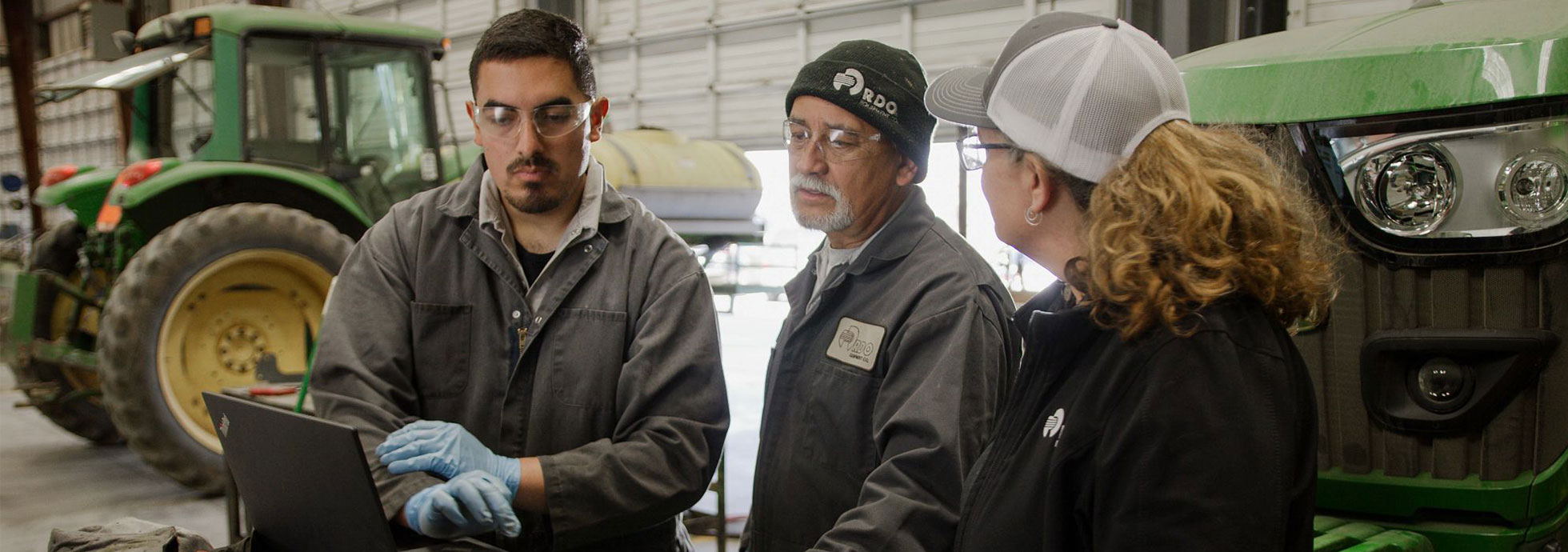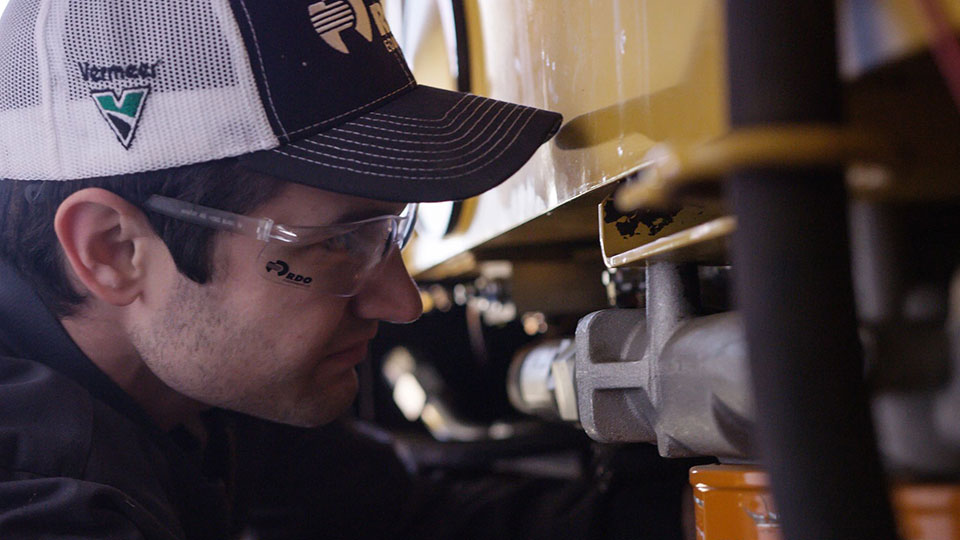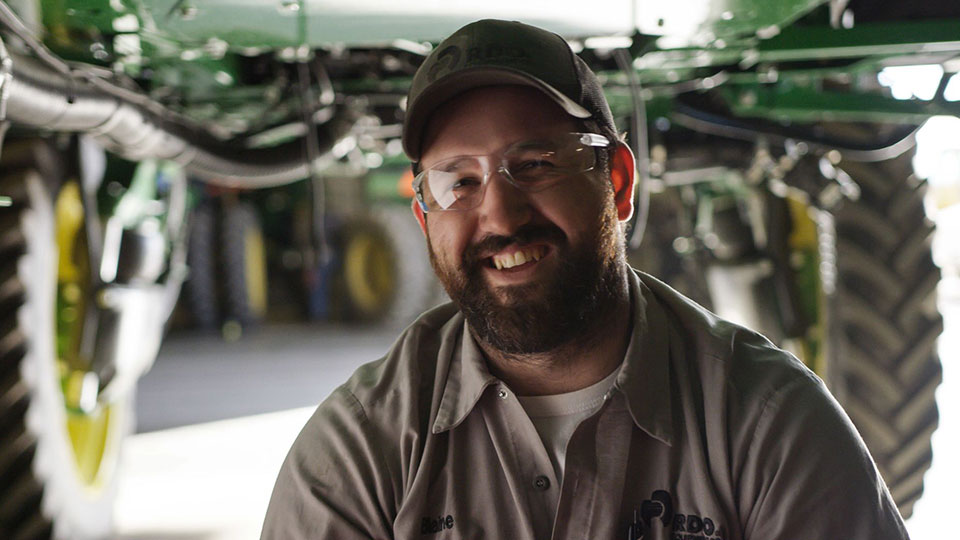
There are a lot of factors to consider when trying to decide which company to embrace as your next employer. Should you decide solely based on pay or benefits? That’s not recommended —- you might hate the work environment. How about culture, is that enough to go on? Not really, you also need to be well-paid and have growth opportunities available when the time comes.
In the end, it’s important to look at an employment opportunity from all angles.
Take into account pay, benefits and culture, sure. But also look at growth potential, average tenure and company stability, history and leadership.
Another factor to consider is the work environment. More specifically, as a heavy equipment mechanic, you will want to think about the size of the company, as this can impact your day-to-day. But what really changes between a small company and a large one?
Does it make that big of a difference?
At RDO Equipment Co., we employ more than 1,000 full-time technicians in more than 80 locations across 12 states. That slots us under the “large dealership” category.
While we do everything possible to ensure the success of our service technicians in the shop and out in the field, we know it can be intimidating to join such a big organization.
Honestly, working as a diesel mechanic at a dealership — whether it’s RDO or somewhere else — isn’t for everyone.
Although not every company is created equally, this article covers some of the upsides and potential downsides of working for a large dealership over a smaller operation.
Dealerships play a crucial role in the success of the American economy. Whether it’s semi-trucks or heavy construction, mining, agriculture or forestry equipment, it’s a dealership’s job to connect businesses (and consumers) with the machinery they use to move the nation forward.
Like other businesses, dealerships can be any size — from one location to 100+. For the purpose of this article, we’ll discuss dealerships that operate multiple locations within more than one state.
From a diesel mechanic’s perspective, there are more than a handful of advantages to working for a large company. Here are four of the major ones.
If you’re looking for the opportunity to use your diesel mechanic talents in a variety of ways, a large dealership could be a good fit. The best companies create financial stability through diversified offerings.
Many large dealerships specialize in servicing an array of heavy equipment across their footprint. These could be different product lines from one manufacturer or multiple.
RDO, for example, has locations specializing in Vermeer, Wirtgen Group, Topcon, John Deere Ag and John Deere Construction equipment — or some combination of these.
This allows service technicians to become proficient in repairing a variety of equipment and challenge themselves each day as they continue to develop.
Sign Up: Service Technician Monthly Newsletter
Become a more profitable, successful mechanic with insights and resources sent to your inbox every month.
While being a large company doesn’t always mean you’re financially stable and able to invest in your employees, in many cases, it does. For mechanics interested in a company that can invest in their development and the facilities they work in, consider a large dealership.
In this context, resources can mean more than financial stability. The ability for a company to offer certain benefits (PTO, overtime, holiday pay, 401k matches, profit sharing, health benefits) is also a resource to consider.
Lastly, larger, more established companies may have internal support departments to help service technicians do their jobs effectively and advance their careers. Internal trainers, safety professionals, learning and development staff and human resources personnel are examples of these.
When it comes to advancing your career — whether it’s into management, into a shop/field leadership role, or outside of the service technician realm — large employers often have more options than a small company would.
With more positions and a more complex organizational structure, if you’re looking to change your role within a large dealership (and have the appropriate conversations with your leader), there’s likely a path to moving within the company.
While this may exist at small dealerships, it’s usually on a lesser scale with fewer options for advancing or moving out of a role.
At a sizeable heavy equipment dealership, there’s typically work to be done at all times. That means mechanics usually receive regular shifts and, in many cases, overtime options. Beyond this, some big dealers (like RDO) offer profit-sharing or bonus incentives for mechanics — rewarding them for their hard work.
Another nice thing about working for a company with a lot of locations (and customers) is that if one location isn’t busy, it may be possible to send a mechanic to a nearby store with more work to do. This ensures a steady paycheck, even during slow times of the year.

While the advantages of working at a big dealership as a diesel technician often outweigh the downsides, there are still some considerations to make.
Most specifically, here are four potential cons of working for a large dealership:
This will be fine for mechanics who love to learn and work on a different thing seemingly every day. Some people prefer to get really good at fixing a more specific range of heavy machinery and equipment though.
Becoming specialized can sometimes be tough at a large company, where machinery from multiple manufacturers rolls through the door every day. This is something to consider as you evaluate a large dealership as your next employer.
If this is a concern, ask about it in your interview. If you will be expected to learn equipment from multiple manufacturers, ask what kind of training and resources they will provide.
There can be a perception that productivity is all that matters at a large dealership. While this could exist at some companies, it’s not the case at the best of them. Instead, employee safety and satisfaction are the most important things within healthy service shops.
However, large dealerships may have a more structured, strict approach to work-order and service deadlines than a small one would. This can be difficult to get used to, especially if you come from an environment with looser deadlines.
It’s important you feel like more than just a number, regardless of the company you work for or its size. At a large dealership with a centralized leadership team, it can be challenging to feel connected to the company’s direction if you’re far from its headquarters.
Compared to those at a small company — particularly one with only a few locations — a big dealership’s mechanics can feel less tuned in to the company’s direction.
As a dealership grows, so does its organizational complexity. Large dealerships have more whole goods and parts inventories to organize and employees to manage.
These companies also have more people involved in the service processes — from parts employees to service managers, to trainers and to salespeople.
While this isn’t bad, it’s something to note if you’re a service technician who prefers to work more independently.

For a lot of mechanics, working at a large heavy machinery dealership is great.
There’s a lot of career growth and income potential, the resources are there to help them thrive and they get to learn new things continuously.
For others, a small company with less strict deadlines, fewer stakeholders and a slimmer catalog of service offerings is better.
In the end, the choice is entirely up to you and a company’s size is only one factor to consider.
Your next step is to read How to Choose a Company to Work for as a Diesel Mechanic, where you’ll learn seven more things to think about when evaluating your next employer.
As a large heavy machinery dealer, RDO takes pride in the opportunities, support and stability we provide the members of our service teams. If you’re looking for a company that will invest in your development, pay you well for your work and make you feel valued every single day, look no further than RDO.
Learn more about our service technician careers and find an open position in your area.
If you have questions we can answer (we can probably answer any you have), reach out to us here.